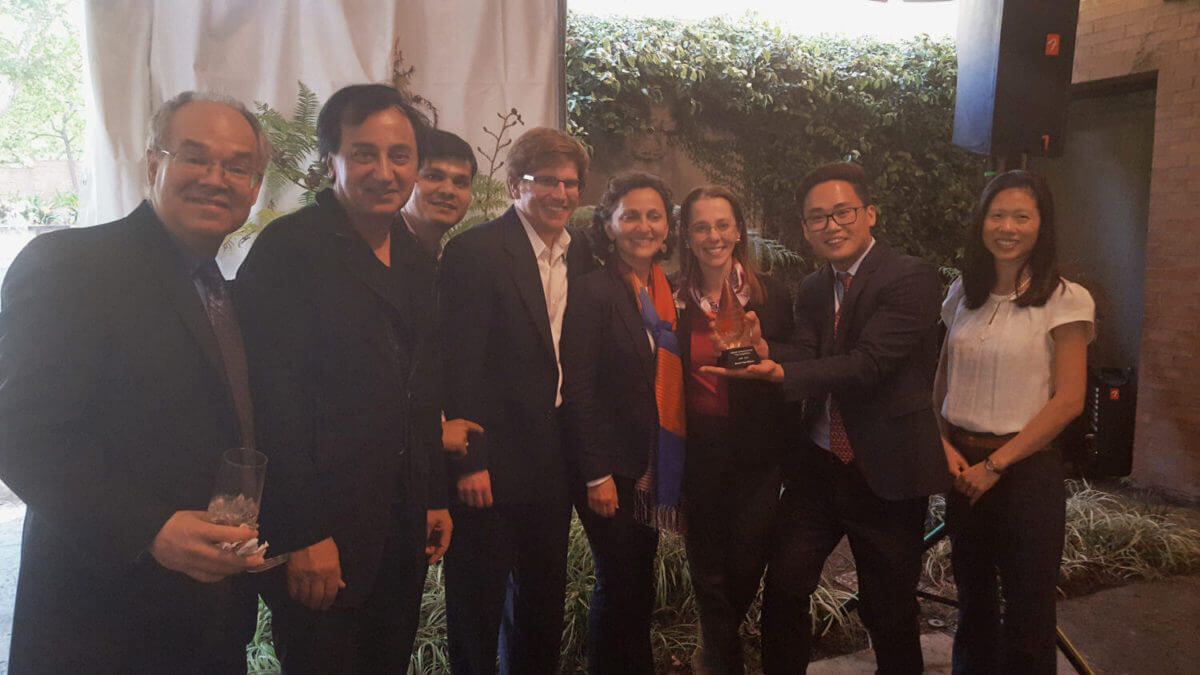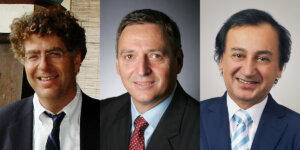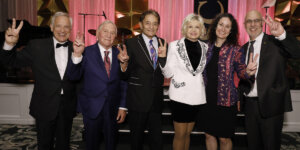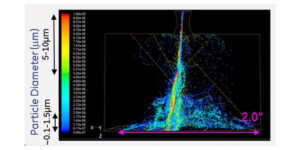
(Left to Right) Peter Beerel, Fariborz Maseeh, Pratik Shah, John Stang, Mahta Moghaddam, Andrea Belz, Sang Cho and Alice Liu (Photo by Maita Schuster)
Doctors waste lots of valuable time – and hospitals lose lots of potential profit – during some minimally invasive surgeries to treat kidney, liver, lung and bone cancers.
That’s because surgeons take high-resolution images with MRIs or CTs to identify cancerous cells before thermal ablation therapy. During surgery, physicians wheel patients out of the OR for additional imaging to ascertain the procedures’ effectiveness. Then it’s back to the operating room.
All told, moving patients in and out adds an additional 30 minutes to ablation therapies. Time is money, especially in the world of medicine.
Members of the startup Thermal View Monitoring believe they have come up with a better way. Team members, including Mahta Moghaddam, USC Viterbi professor of electrical engineering, have developed an image guidance system that provides a real-time, 3-D temperature map during thermal ablation therapy. Best of all, unlike with MRIs and CTs, physicians could take quality images right in the OR. The result: significant time and cost savings.
On Wednesday, March 22, before an audience of about 75 at the Davidson Conference Center, Thermal View took home the $50,000 grand prize, plus $20,000 in free legal services, at the seventh annual Maseeh Entrepreneurship Prize Competition (MEPC).
“Through the process of customer discovery in this competition, now we know there is actual demand for our technology,” said Sang Cho, a company executive and a Ph.D. student in health economics at USC. “It feels great.”
MEPC, founded in 2010 with a $1 million endowment from entrepreneur Fariborz Maseeh, has become one of the premier business model competitions for USC Viterbi and other students, faculty and would-be business builders.
This year, a record 60 teams applied for 17 slots. The field was whittled down to eight finalists on March 6. Judges selected the four winners at the March 22 event.
Teams competed for over $100,000 in cash and business and legal services offered by Stubbs Alderton & Markiles, LLP, a business law firm, Sherman IP, LLP, an intellectual property law firm, and Callbox, a sales and marketing firm.
The competition “produced the most substantial set of companies I have seen,” said MEPC namesake Maseeh.
The other 2017 MEPC winners are:
2nd Place – Night Time Seizure Monitor, which allows parents to monitor their epileptic children’s seizure activity at night.
3rd Place – Innov8tia Environmental Engineering, which is commercializing advanced hazardous sludge treatment solutions.
4th Place – Silicon Ribbon, which wants to create software that would allow for monitoring of devices in safety-critical systems in cars and airplanes.
The other finalists include:
Cradle – A smart, ergonomic chair that tracks and improves posture with real-time feedback.
Pattern-Based Sound Extraction – Provider of a sound-separation capability that enhances the hearing of the hearing-impaired.
Pichi – A mobile app that encourages people to take their medication by linking adherence to the care of a virtual pet.
Sponge Detection Software – Software that automatically detects the existence of unremoved surgical sponges in X-ray images taken near the end of operations.
Over the course of five months, USC Viterbi student-led MEPC teams attended workshops about customer discovery, startup financials, intellectual property and giving a good company pitch to an investor.
MEPC participants said they found the educational sessions particularly valuable.
“The classes we had, the workshops we had, made us rethink our business model,” said Ali Marijaninejad, a USC Viterbi graduate student in electrical and biomedical engineering and a member of Cradle, maker of a “smart” chair. “We learned a lot.”
For the third consecutive year, each team received $2,500 from the National Science Foundation to canvass potential customers around the country to learn their problems and how they might address them. The NSF awarded the money to USC through an Innovation Corps “I-Corps” Site grant.
As in recent years, mentors – the competition’s “secret sauce,” in the words of Andrea Belz, USC Viterbi’s vice dean of technology innovation and entrepreneurship – worked closely with the teams.
Additionally, professors from the the Lloyd Greif Center for Entrepreneurial Studies at the USC Marshall School of Business, including Pai-Ling Yin and Greg Autry, taught some of the workshops and made their expertise available to the budding entrepreneurs. “This cross pollination with Marshall is an important one,” USC Viterbi Dean Yannis Yortsos said.
MEPC has spawned several promising companies.
The 2015 champ, BIRS, leverages proprietary eye-tracking software for a quick and objective concussion assessment. The 2014 victor, ComfortCorrect, makes affordable braces that incorporate programmable memory wire technology.
Second Spectrum, the 2013 champion, analyzes Big Data for insights into sport performance, such as what constitutes good defense and offense in basketball. The firm counts the Los Angeles Clippers and Boston Celtics among its many NBA clients. Abtum, the 2011 winner, offers solutions for handsets, tablets and ultra-books, providing better filters in critical performance metrics and significant annual savings for customers.
“MEPC inspires our engineers to turn engineering ideas into real products, companies, and solutions,” said Alice Liu, assistant director of the Office of Technology Innovation and Entrepreneurship. “It challenges them to take what is learned in the classroom or lab and to apply it to solving a real-world problem. MEPC is designed to come alongside our innovators with their ideas and empower them to turn them into feasible business models.”
Peter Beerel, MEPC program director, said this year’s competition not only lived up to his expectations but also surpassed them.
“We had really strong teams. We had really strong teaching. We had a really strong commitment from the mentors,” he said. “This has been the best MEPC all around.”
Published on March 29th, 2017
Last updated on June 20th, 2018











